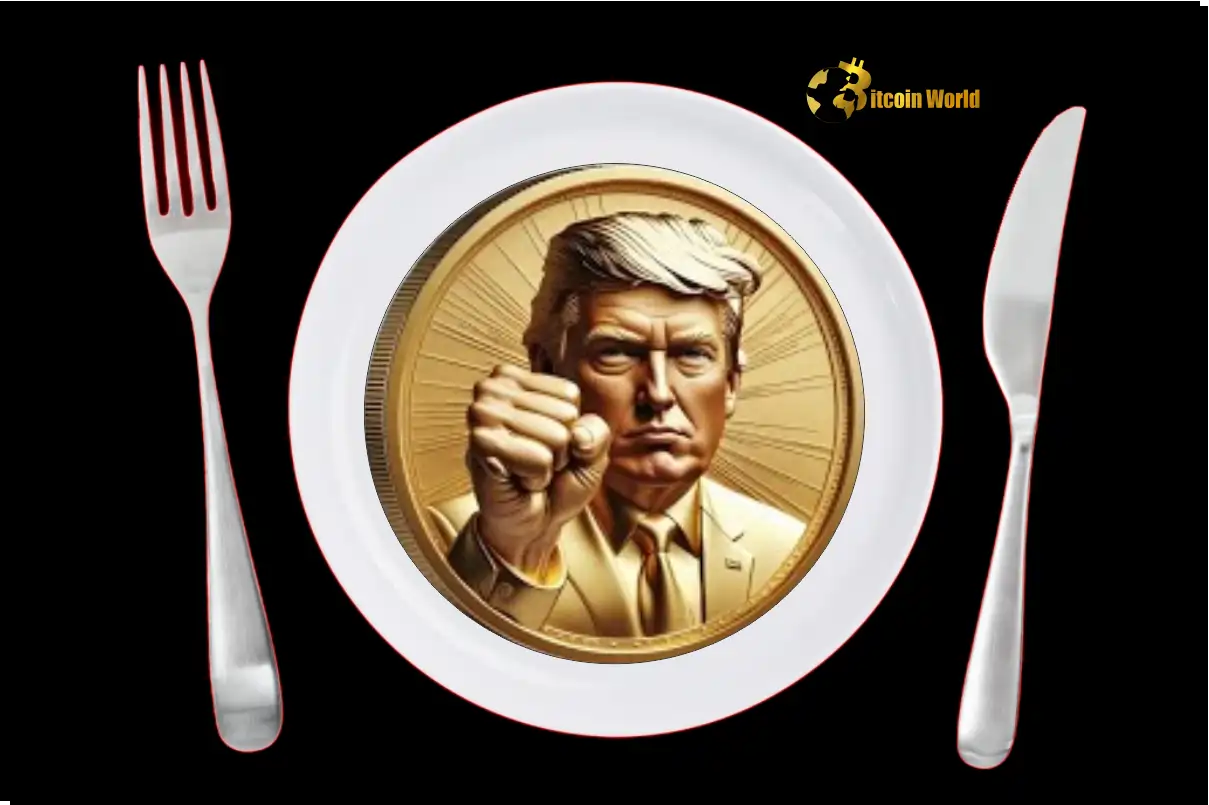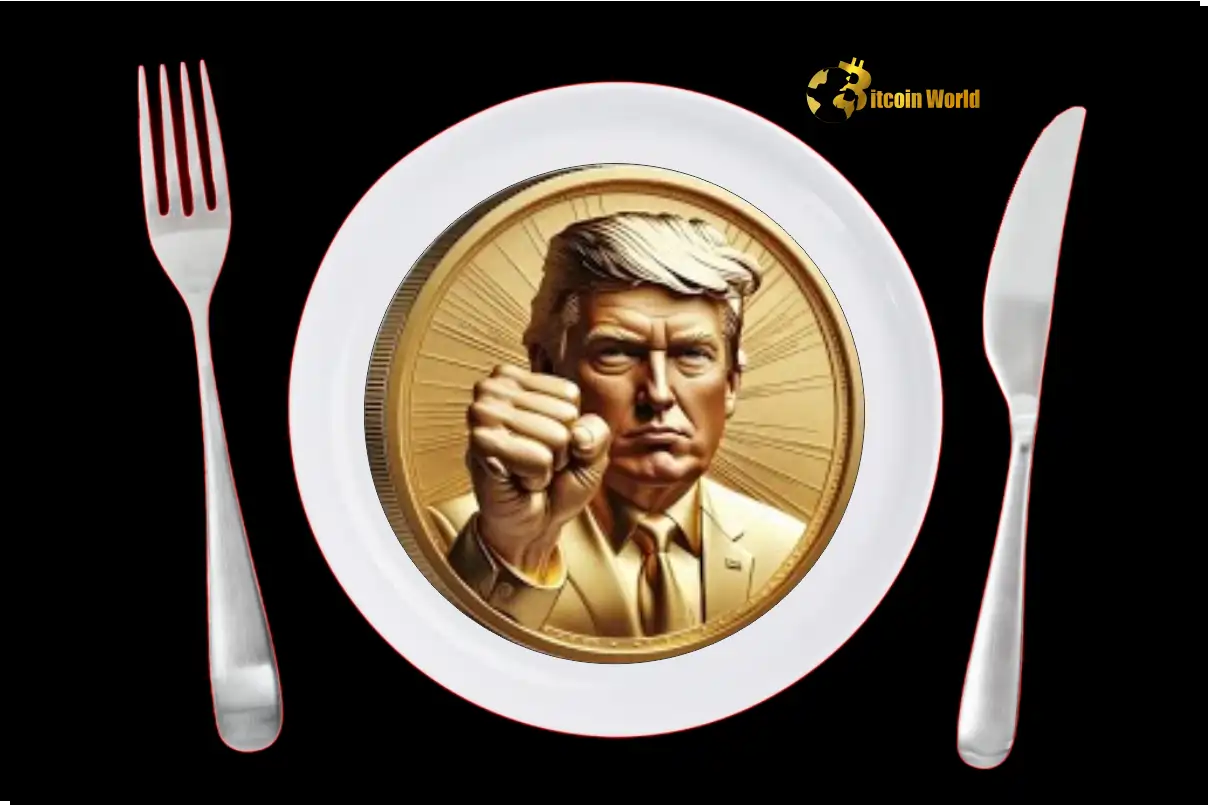BitcoinWorld

Trump Crypto Dinner Triggers Political Firestorm
A recent private dinner hosted by former President Donald Trump, attended by prominent figures from the cryptocurrency world, particularly those involved with memecoins, has ignited a significant political controversy. This event, framed by some as a campaign fundraising effort and by others as a potential conflict of interest, has drawn sharp criticism from Democratic lawmakers. The fallout highlights the increasing intersection of cryptocurrency and US politics, bringing issues of transparency, regulation, and potential conflicts of interest to the forefront.
Inside the Trump Crypto Dinner
The dinner in question took place at Trump’s golf club near Washington, D.C. It brought together the former president with a group of individuals reportedly involved in the memecoin and broader crypto space. Reports indicate attendees included notable figures such as Justin Sun, the founder of Tron and a prominent figure in the crypto industry. The gathering underscores the growing interest among political figures in engaging with the crypto community, whether for fundraising purposes, gauging industry sentiment, or exploring potential policy stances.
The nature of the attendees, specifically those linked to memecoins – digital assets often characterized by high volatility and driven by social media trends rather than underlying fundamentals – has added a layer of complexity to the discussion. Critics argue that associating with this segment of the crypto market raises questions about the legitimacy and stability of the financial interests involved.
Why are Federal Officials Crypto Holdings a Concern?
The core of the controversy stems from concerns about potential conflicts of interest. Democratic lawmakers, led by figures like Representative Maxine Waters and Senators Elizabeth Warren and Chris Murphy, argue that federal officials, or those seeking federal office, profiting from or being influenced by investments in speculative assets like memecoins could compromise their ability to act in the public interest. The argument is that personal financial stakes in the crypto market could sway policy decisions regarding regulation, taxation, or adoption of digital assets.
This isn’t a new debate. Discussions around financial transparency and potential conflicts of interest for politicians and government employees have long existed, typically focusing on stocks, bonds, or real estate. However, the rapid rise and unique characteristics of cryptocurrencies, including their decentralized nature, volatility, and sometimes opaque origins, introduce new challenges to existing ethics frameworks.
Concerns often cited include:
- Policy Influence: Officials holding significant crypto assets might be incentivized to push for favorable regulations (or lack thereof) that benefit their personal portfolios.
- Market Manipulation: While less likely for high-level officials, the potential for information asymmetry or leveraging political positions to influence market sentiment is a theoretical risk.
- Public Trust: The appearance of impropriety, where officials seem to be prioritizing personal gain over public service, erodes trust in government institutions.
The dinner has amplified these concerns, prompting calls for stricter rules regarding how federal officials can invest in or interact with the crypto market.
Pushing for New Crypto Legislation US
In response to the dinner and broader concerns, Democratic lawmakers are actively pursuing new legislative measures. The stated goal is to introduce bills that would specifically address federal officials’ involvement with cryptocurrency, aiming to prevent them from profiting from these assets while in office or potentially even before taking office.
Key figures involved in this legislative push include:
- Rep. Maxine Waters: A ranking member of the House Financial Services Committee, she has historically been critical of the crypto market and advocates for robust consumer protection and regulation.
- Senator Elizabeth Warren: Known for her tough stance on financial regulation, Senator Warren has been a vocal critic of the crypto industry, citing concerns about illicit finance, consumer risks, and energy consumption. She has proposed legislation aimed at cracking down on crypto’s use in illegal activities.
- Senator Chris Murphy: Another voice expressing caution regarding the crypto market’s potential risks and the need for regulatory clarity.
While the specifics of the proposed legislation are still developing, potential measures could include:
- Outright bans on federal officials and potentially their immediate families holding or trading cryptocurrencies.
- Mandatory disclosure requirements for any crypto holdings, similar to existing rules for other financial assets, but potentially with stricter thresholds or more frequent reporting.
- Restrictions on participating in policy discussions or decisions that could directly impact crypto assets they hold.
This legislative effort signals a growing intent within certain political factions to bring the crypto market under closer scrutiny and apply existing ethics standards, or develop new ones, specifically tailored to digital assets.
The Growing Influence of Memecoin Investors and Crypto in Politics
The presence of Memecoin investors at the dinner highlights a fascinating, and for some, troubling trend: the increasing financial power and political engagement of individuals who have amassed wealth through highly speculative digital assets. While Bitcoin and Ethereum investors have long been part of the crypto political landscape, the rise of memecoins has created a new class of potentially wealthy individuals eager to see their investments legitimized and protected from adverse regulation.
This event serves as a potent example of how quickly fortunes can be made in the crypto world and how those fortunes are increasingly being directed towards political influence. The crypto industry as a whole has ramped up lobbying efforts and campaign contributions significantly in recent election cycles, seeking to shape legislation and regulatory frameworks in Washington D.C. and state capitals.
The dynamic is clear: as crypto wealth grows, so does the potential for political spending and access. This raises questions about the fairness of the political process and whether policy could be unduly influenced by specific financial interests within the crypto market.
Examining Political Crypto Donations: Benefits and Challenges
The practice of accepting Political crypto donations is becoming more common, presenting both perceived benefits for campaigns and significant challenges and ethical considerations.
Potential Benefits for Campaigns:
- New Funding Stream: Taps into a potentially wealthy donor base that might not traditionally contribute through conventional means.
- Appealing to a Demographic: Signals to younger, tech-savvy voters that a candidate is forward-thinking or supportive of innovation.
- Ease of Transfer: For some, crypto donations can be simpler than traditional wire transfers or checks, especially for international donors (though regulations apply).
Significant Challenges and Concerns:
- Volatility Risk: The value of a crypto donation can fluctuate dramatically between the time it’s received and when it’s converted to fiat currency, creating financial uncertainty for campaigns.
- Regulatory Ambiguity: Rules around reporting and valuing crypto donations are still evolving, creating compliance headaches.
- Source Verification: Tracing the origin of crypto funds can be difficult, raising concerns about accepting donations from illicit activities or foreign sources.
- Public Perception: Accepting large donations from individuals associated with highly speculative or controversial crypto projects can lead to negative media attention and public distrust.
- Conflict of Interest: As highlighted by the Trump dinner, accepting funds from specific crypto stakeholders raises questions about potential policy influence.
A simple comparison illustrates the complexity:
| Aspect | Traditional Fiat Donations | Political Crypto Donations |
|---|---|---|
| Value Stability | Relatively stable | Highly volatile |
| Source Tracing | Generally clear via banking system | Can be challenging depending on asset/platform |
| Regulatory Framework | Well-established (FEC rules) | Evolving, subject to interpretation |
| Public Perception | Widely accepted norm | Often viewed with skepticism/concern |
What Does This Mean for Crypto Enthusiasts and Voters?
The intersection of politics and crypto is becoming impossible to ignore. For individuals involved in the crypto space, whether as investors, developers, or enthusiasts, these developments have several implications:
- Increased Scrutiny: Expect more attention from regulators and politicians on crypto activities.
- Potential Policy Changes: New legislation regarding taxation, regulation, and how political figures interact with crypto is likely.
- Importance of Education: Understanding the political process and advocating for clear, sensible regulation is crucial.
- Informed Voting: Researching candidates’ stances on crypto and financial regulation is becoming increasingly relevant.
Examples of differing political approaches are already evident, with some politicians embracing crypto as innovation and others viewing it primarily through a lens of risk and illicit activity. The debate is far from settled.
Conclusion: A Collision Course?
The dinner hosted by former President Trump for memecoin investors has served as a flashpoint, dramatically illustrating the growing tension between the burgeoning world of cryptocurrency wealth and the traditional structures of political ethics and regulation in the United States. While proponents see such interactions as legitimate engagement with a significant economic force and a source of campaign funding, critics view them through the lens of potential corruption and undue influence.
The resulting push for new Crypto legislation US, particularly focusing on restrictions for Federal officials crypto holdings and activities, signals a clear intent by some lawmakers to establish stricter boundaries. As Political crypto donations become more commonplace and figures associated with speculative assets like those held by Memecoin investors gain political access, the debate over transparency, conflict of interest, and the future of crypto regulation in the US will only intensify. This episode underscores the critical need for clear rules that protect the integrity of government while allowing for innovation in the digital asset space.
To learn more about the latest crypto market trends, explore our article on key developments shaping Bitcoin institutional adoption.
This post Trump Crypto Dinner Triggers Political Firestorm first appeared on BitcoinWorld and is written by Editorial Team





